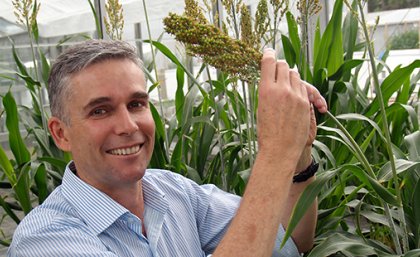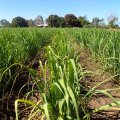
Scientists must speak out about the benefits of new genetic technologies such as genetically modified organisms (GMOs) and gene editing, according to The University of Queensland’s new Director of Crop Science, Professor Ian Godwin.
Professor Godwin is the author of Good Enough to Eat?, a new book about new genetic plant and animal breeding technologies.
It charts the history of genetically modified foods from the laboratory to the global dinner plate, and outlines the huge potential of new gene editing technologies, such as CRISPR.
He hopes the book will help end fear and misinformation generated by “fake news” about the safety of genetically modified foods.
“The future of billions of people literally depends on changing the narrative about how we view genetically modified food and genetic technologies,” Professor Godwin said.
“If we are to produce more sustainable and nutritious food to meet the growing global demand – in the face of challenges from pests and diseases, eroded soils, lack of water and climate change – we need to be able to take the best from the latest genetic technologies and from organic and agro-ecological farming practices.”
 With 30 years’ experience in agribiotechnology across crops ranging from sorghum, wheat and barley to beans and taro, Professor Godwin calls genetic technologies – such as CRISPR gene editing – a biological revolution.
With 30 years’ experience in agribiotechnology across crops ranging from sorghum, wheat and barley to beans and taro, Professor Godwin calls genetic technologies – such as CRISPR gene editing – a biological revolution.
“Genetically modified, or GM, crops use 37 per cent less pesticide, and increase crop yields by 22 per cent and farmer profits by 68 per cent – and the promise of new genome editing techniques is simply astonishing,” Professor Godwin said.
“But we have to stop pretending that ‘natural is best’ and challenge the notion that organic food companies are not actually big global companies with a conflict of interest when it comes to the GMO debate.”
He said environmental groups that worked to restrict countries from growing or receiving GM foods proven to be safe and effective should be held morally accountable for their actions.
Sir Gordon Conway – author of One Billion Hungry: Can We Feed the World? – has described Good Enough to Eat? as “a lively dialogue” that tackles the “highly vociferous and unprincipled opposition from some sectors of the public who choose to ignore facts and realities” about GM food.
“Ian Godwin is a first-class scientist and his book gives us answers how food can be grown and engineered to meet one of the world’s most important challenges,” Professor Conway said.
In the book, Professor Godwin describes his experiences eating some of the world’s first gene-edited cabbage, prepared by Sweden’s Chef of the Year 2010 Gustav Tradgårdh; a horror story working with celery; and his time as part of a sorghum and cotton team in Biloela in Central Queensland, where locals rushed to get washing inside before crop dusters flew overhead and dumped huge amounts of endosulfan and other chemicals on crops.
“In those days in peak season, spraying was happening every day in any given region, and some growers were spraying their crops up to 17 times per growing season to ward off caterpillars – but now GM cotton has reduced the need to spray for insects to once or twice per season.”
Professor Godwin said genetic technologies would continue to play a critical role in world-leading crop science undertaken at UQ – which is ranked fourth globally in the field of agricultural science and has been recognised internationally for its plant breeding expertise.
001_Ian Godwin GMO Book Launch_002 from The University of Queensland on Vimeo.
“This is an exciting and challenging time for agriculture and the bio-economy,” Professor Godwin said.
“Our focus will continue to be on improving crop productivity, food quality and sustainability in the crop sciences, and we will use every safe, effective and innovative tool in the toolbox to do so.”
Media: Professor Ian Godwin, i.godwin@uq.edu.au, +61 7 336 52141; Margaret Puls, qaaficomms@uq.edu.au, 0419 578 356.











